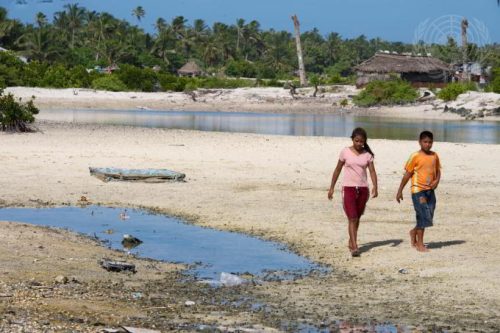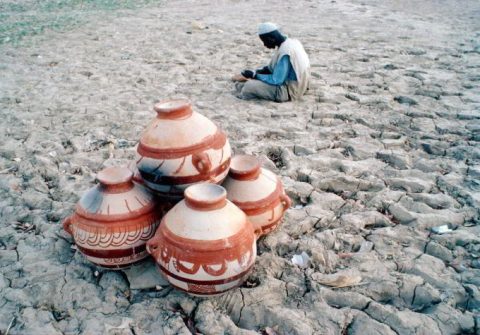The Earth, “The Common Home” of humanity.

The encyclical Laudato Si’ offers a new way of thinking about our understanding of the current planetary crisis of environmental degradation, the causes of this situation and the path to recovery.
The new vision of reality offered by Laudato Si’ can be defined as integral ecology. It is a new paradigm or manifesto that Pope Francis proposes for the care of creation in the current era of planetary emergency. The integral approach permeates and runs through the entire encyclical: the perception of the Earth as a common home; an integral understanding of the ecological crisis as a cry of the Earth and the poor; a positive vision of the natural world as the “Gospel of creation”. Significantly, Laudato si’ has precisely this subtitle: “On the care of our common home”. The earth is our ‘home’ and it is much more than just the environment that surrounds us.
The world is not just an environment that we can exchange for another, migrating somewhere else, as soon as our planet becomes uninhabitable, as is sometimes presented by science fiction and the media. Earth is actually our only home.

“What kind of world do we want to leave to those who come after us, to children who are growing up?” UN Photo/Eskinder Debebe.
The Pope describes the various manifestations of the contemporary ecological crisis, underlining in particular that we have inflicted serious damage on the Earth “due to the irresponsible use and abuse of the goods with which God has endowed her” (2): pollution and waste, climate change, the depletion of natural resources, especially water,
and the loss of biodiversity.
According to the pontiff, we are playing a risky and senseless game of chance with the future of our common planetary home and of our brothers and sisters, especially future generations. Against the current alarming situation, Francis forcefully asks: “What kind of world do we want to leave to those who come after us, to children who are growing up?” (160). We could leave just rubble, deserts and rubbish to future generations. Francis forcefully denounces that the rate of consumption, waste and alteration of the environment, beyond any denialism, is exceeding the possibilities of survival of the planet, in such a way that the current unsustainable lifestyle can only result in catastrophes, as is already happening periodically in various regions of the globe.
According to the pontiff, “Today, however, we have to realise that a true ecological approach always becomes a social approach; it must integrate justice into debates on the environment, so as to hear both the cry of the Earth and the cry of the poor” (49 ).
Ecological Debt
Laudato Si’ places social justice and environmental justice in close connection. The sad paradox of the contemporary ecological crisis is that it is caused primarily by a minority of extremely wealthy people, whose victims are the poor and vulnerable members of humanity.

“Today, however, we have to realise that a true ecological approach always becomes a social approach; it must integrate justice into debates on the environment, so as to hear both the cry of the Earth and the cry of the poor”. UN Photo/John Isaac
The encyclical denounces various cases of ecological and social injustice in today’s world. The most relevant is the issue of “ecological debt”. On this problem, the Pope writes: “A true ‘ecological debt’ exists, particularly between the global north and south, connected to commercial imbalances with effects on the environment, and the disproportionate use of natural resources by certain countries over long periods of time. The export of raw materials to satisfy markets in the industrialized north has caused harm locally, as for example by mercury pollution in gold mining or sulphur dioxide pollution in copper mining… The warming caused by huge consumption on the part of some rich countries has repercussions on the poorest areas of the world, especially Africa, where a rise in temperature, together with drought, has proved devastating for farming.” (51).

“There are not two separate crises, one environmental and another social, but rather a single and complex socio-environmental crisis”. 123rf
Linked to this, according to Francis, is the deterioration not only of our physical home but also of our social ties, which are intimately connected with it: “The human environment and the natural environment deteriorate together; we cannot adequately combat environmental degradation unless we attend to causes related to human and social degradation” (48). And later he writes that “there are not two separate crises, one environmental and another social, but rather a single and complex socio-environmental crisis” (139) … Everything is connected. “This requires a concern for the environment combined with a sincere love for human beings and a constant commitment to society’s problems” (91).Pope Francis speaks of solidarity and the preferential option for the poor as the best means to achieve the common good and promote eco-justice. In the current conditions of world society, where there are so many inequalities and an ever-increasing number of people who are discarded, and deprived of fundamental human rights, the principle of the common good is immediately transformed, as an unavoidable consequence, into a call for solidarity and a preferential option for the poorest.
“This option – says the document – requires drawing the consequences of the common destination of the earth’s goods… it requires contemplating first of all the absolute dignity of the poor in the light of the deepest convictions of faith. It is enough to observe reality to understand that today this option is a fundamental ethical requirement for the effective realization of the common good” (158).
“The Gospel of Creation”
A third characteristic of integral ecology is openness to a positive and religious vision of the natural world seen as creation, that is, the work of God. The same title of the second chapter of Laudato Si’, in which Pope Francis offers the theological vision of the natural world, is highly significant. The chapter bears the title “The Gospel of Creation” and offers the theological foundations of the ecological vision of the encyclical. This states that creation is truly gospel, Evangelion, that is, “good news”. In the wake of modernity, we have been too accustomed to looking at the natural world as inert matter – the Cartesian res extensa, as in modern science – or simply as an emporium of resources to be exploited, as in neo-liberal economics. Laudato Si’ is radical not only as a social doctrine but also as a theology of creation.

Laudato Si’ is radical not only as a social doctrine but also as a theology of creation. 123rf
Creation is good news because of two fundamental truths about it. First of all, creation has a fundamental and original goodness, as we read in the book of Genesis. Secondly, the physical world was brought into existence as an act of love by the triune God. Creation, therefore, is the bearer of an original blessing. The fundamental goodness of creation in the eyes of God is, for a believer, the founding basis of the intrinsic value of every created reality. If God created the world, then the world and everything in it, including all forms of animate and inanimate matter, must have value.
A second aspect regarding creation is that it manifests a ‘love story’ on the part of God. For those who have faith, the universe is not an accident, a random event or a stroke of luck, as is sometimes assumed by secular thought and culture or non-believers.
Every creature is brought into existence out of love and with a specific purpose. God’s expansive love is what animates every creature.

Every creature is brought into existence out of love and with a specific purpose. God’s expansive love is what animates every creature. 123rf
The entire creation, Francis also says, is “open to the transcendence of God, within which it develops” (79). And God is not only transcendent to creation but is also profoundly immanent in it. Creation is truly the oikos (house) of God, as it is imbued with the divine presence. The glory of God resounds throughout the universe in and through the resurrected Christ whose life now flows throughout the cosmos through the life-giving Spirit. In this way, the creatures of this world no longer present themselves to us as a merely natural reality, because the Risen One mysteriously envelops them and directs them to a destiny of fullness. (Open Photo: 123rf)
Joshtrom Isaac Kureethadam



